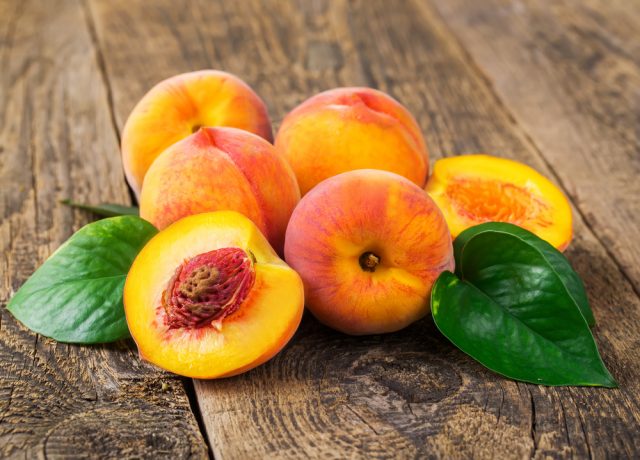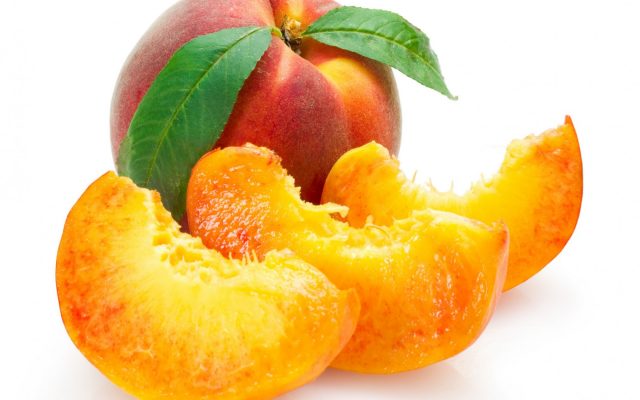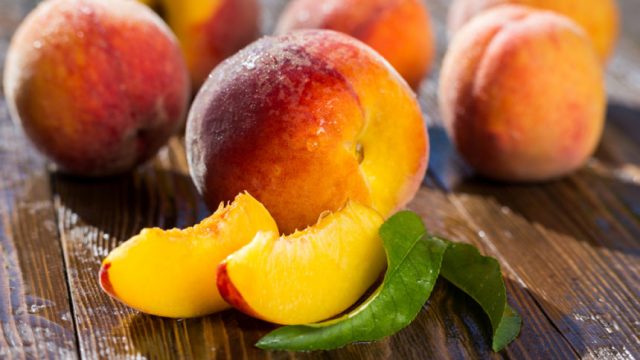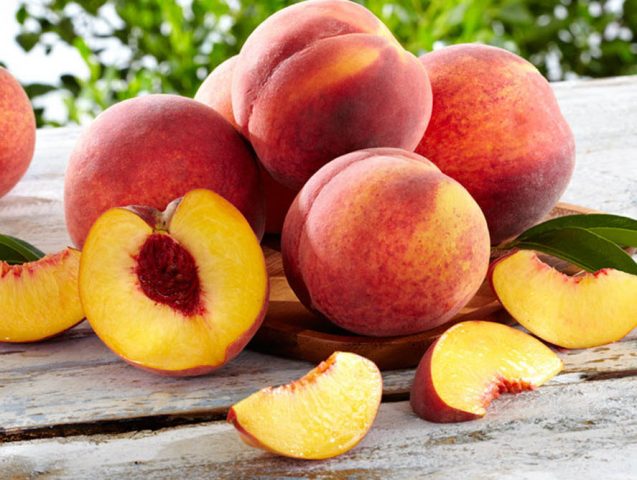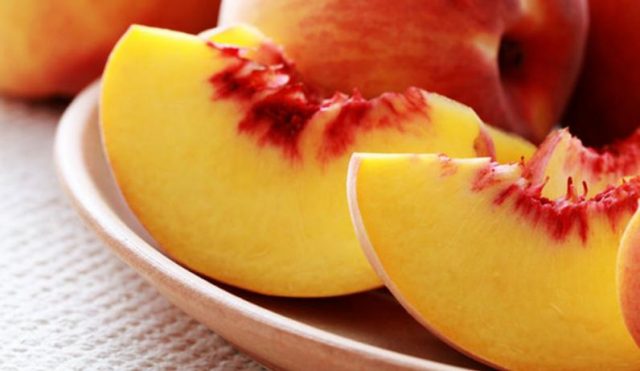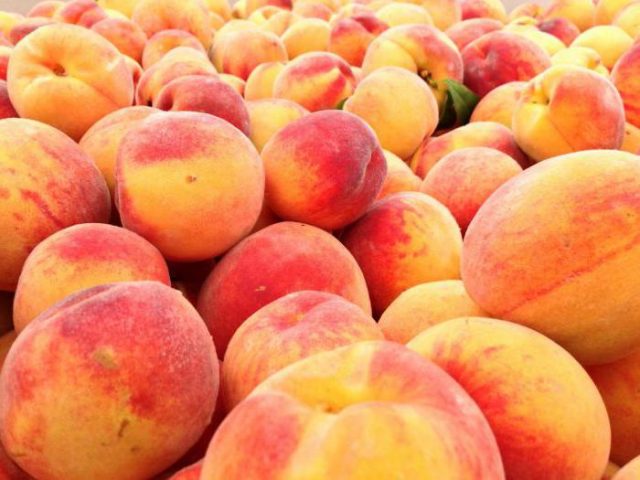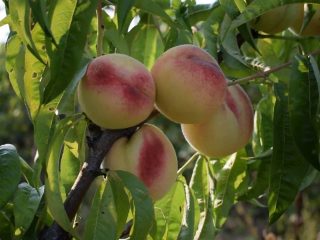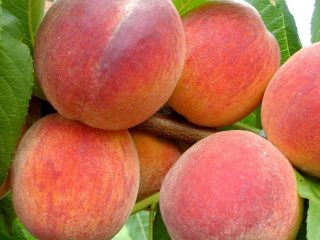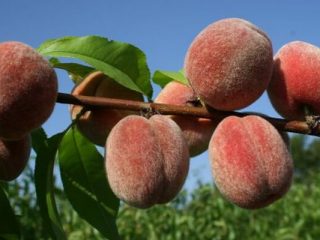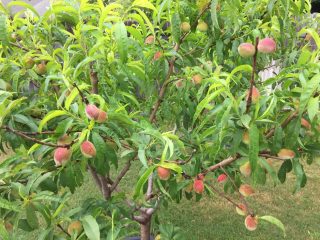Content
- 1 A peach is a fruit or a berry
- 2 Why peach is useful for the human body
- 3 How to eat a peach correctly
- 3.1 How to eat peaches for gastrointestinal diseases
- 3.2 Is it possible to peaches with gallstone disease
- 3.3 Is it possible to eat peaches with urolithiasis
- 3.4 Is it possible with diabetes mellitus to eat peaches
- 3.5 Is it possible to eat peaches with pyelonephritis
- 3.6 How many peaches can you eat per day
- 4 Is it possible to eat peaches while losing weight
- 5 The benefits and harms of peach seeds
- 6 Healing properties of peach leaves
- 7 The use of peach in cosmetology
- 8 For what diseases you can not eat peaches
- 9 Conclusion
The health benefits and harms of peaches raise many questions - a tasty fruit does not always have a beneficial effect on the body. To understand what determines the perception of peaches by the body, you need to study their properties.
A peach is a fruit or a berry
By definition, berries are fruits with many seeds inside, usually ripening on low bushes. Since peaches grow on trees, and inside they have a single large bone, they cannot be attributed to berries, they are fruits.
Nutritional value and composition of peach
The product owes its benefits to its rich composition. The fruit contains organic acids and antioxidants, ash and starch, natural sugars. Minerals are presented in large quantities:
- potassium and phosphorus;
- iron and manganese;
- zinc and silicon;
- sulfur and chlorine;
- calcium, iodine, nickel and fluorine.
The benefits of regular consumption of the fruit are expressed in the fact that it maintains the balance of trace elements in the body at the right level and allows you not to experience a lack of nutrients.
What vitamins are found in peaches
The product is a rich source of vitamins. Most of all it contains ascorbic acid, but, in addition, it contains:
- vitamins E and H;
- nicotinic acid PP;
- vitamin A;
- a wide group of vitamins from subgroup B - B2 and B5, B1 and B6, B9.
How many calories are in a peach
The nutritional value of a product depends on its variety. However, on average, 100 g of fruit pulp contains 38 to 50 kcal. As a rule, sweet varieties have a higher calorie content.
BJU content in peach
From the point of view of nutrients, the product consists mainly of carbohydrates - there are about 9 g of them in the fruit. Only 0.9 g is the share of proteins, and fats take only 0.1 g. The main part of the composition is water - as much as 86 g.
Why peach is useful for the human body
The beneficial properties of peach are very diverse. If consumed on a regular basis, this fruit will have the following effects:
- will help remove sand and stones from the kidneys due to its diuretic properties, relieve swelling and excess fluids;
- will strengthen the heart system, increase the elasticity of blood vessels, the fruit contains a lot of useful potassium;
- will improve the functioning of the nervous system and brain - it is useful to use the product in case of intense mental activity;
- protects vision from possible ailments, the fruit is beneficial as the prevention of cataracts and myopia;
- will help strengthen the immune system and cure colds, since the product contains vitamin C, it has pronounced anti-inflammatory properties;
- will establish metabolic processes in the body and help solve the problem of constipation - the fiber in the product quickly cleanses the body of toxins.
The benefits of the product include its beneficial effect on mood, it helps to cope with irritability, chronic fatigue and anxiety. And of course, the product is of great benefit for vitamin deficiency - its composition can be considered a real vitamin cocktail.
Why are peaches useful for men
The anti-inflammatory properties of the product are beneficial for the male body. It is recommended to use it for diseases of the prostate gland, it prevents inflammation and helps to cope with the existing disease. Potassium in the fruit has a beneficial effect on the heart and blood vessels, this is a great benefit for men, especially those prone to early heart attacks.
In addition, the product benefits male hormonal levels and has a positive effect on potency - with regular use of the fruit, libido improves.
When can you give your child a peach
The strengthening properties of the fruit are of great benefit to children, the peach protects the child's eyesight, improves the state of his immunity, and supports normal digestion. But for the first time, the product can be introduced into the diet no earlier than 7 months of the baby's life - along with the first complementary foods and in very small quantities.
Since the fruit often causes allergies, you should first offer your child a few drops of freshly squeezed juice. If a negative reaction does not follow, then it is allowed to offer the baby peach puree from time to time, no more than 70 g per day.
Why are peaches good for the cardiovascular system?
The benefits of peach for the heart and blood vessels are primarily due to the high content of potassium and magnesium. The fruit strengthens the vascular walls, prevents the accumulation of harmful cholesterol and protects the body from atherosclerosis. The use of the fruit is beneficial in the prevention of ischemia and arrhythmias, strokes and heart attacks. Peach prevents blood clots, so it will be especially beneficial in old age.
How to eat a peach correctly
Peach brings mainly benefits to the body and rarely causes harm, but you need to know how to use this fruit for various diseases. In some situations, ripe fruit must be approached with caution and severely limited in number.
How to eat peaches for gastrointestinal diseases
The fruit brings special benefits to the digestive system, since it is able to qualitatively cleanse it of toxins and improve metabolism. However, it is in diseases of the gastrointestinal tract that peach can seriously damage if used carelessly.
With gastritis
Peaches for gastritis are practically contraindicated fresh. Ripe pulp contains too many acids and sugars, which irritate inflamed mucous membranes. Fresh fruit provokes additional production of hydrochloric acid, which only worsens the condition.
However, peach can be consumed during remission, especially in the form of compotes and mashed potatoes, as well as with cereals and cottage cheese. You can usefully eat fresh fruit, but only after the main meal and on a full stomach.
With pancreatitis
Acute inflammation of the pancreas becomes the reason to completely remove the peach from the diet until the pain subsides. During the period of a calm course of the disease, you can use the fruit, but in small quantities and mainly in processed form - like mashed potatoes or compote with pieces of pulp.
With an ulcer
During an exacerbation of an ulcer, a fresh peach will harm the body, since the acids in its composition will complicate the course of the disease. Before entering a state of remission, the fruit will need to be completely excluded from the diet.
With a calm course of the disease, you can use peaches, this will be beneficial. But you need to eat them a little and together with other food products. It is not recommended to take them on an empty stomach - this will irritate the mucous membranes and may cause an exacerbation.
How much peach is digested
Despite the low calorie content, the peach is digested for a long time. On average, the body absorbs it in 40 minutes, so before you eat a peach in the evening, you need to calculate the time remaining until bedtime.
Peach weakens or strengthens
The benefits of peach are in demand in case of a tendency to constipation, since it has a laxative effect. The fruit activates peristalsis, but it does so very gently. Therefore, in case of short-term problems with stool, it is worth giving preference to it, and not to powerful pharmaceutical drugs. The benefit will be that the fruit will help to cope with constipation, and you will not have to restore the microflora after eating it.
Is it possible to eat peaches at night
You can eat peaches at night, but in reasonable quantities and with care. The nutritional value of the fruit is low, for example, the calorie content of a fig peach is only 36 kcal per 100 g. In addition, there are almost no fats in the composition, so the fruit will not harm the figure.
But eating a peach before bedtime will start active digestive processes in the body, and in the morning the laxative effect of the product may appear. If this effect is undesirable, then eating a peach in the evening is worth it early and in a small amount.
Is it possible to peaches with gallstone disease
For bile problems, it is recommended to consume more fiber, and fruits are the best source of dietary fiber. Therefore, a peach with gallstone disease will be of great benefit - it will improve the motility of the digestive tract, increase the secretion of bile and prevent its stagnation.
Is it possible to eat peaches with urolithiasis
For kidney stones, fresh food can also be beneficial and harmful. Its value lies in the fact that, due to its diuretic properties, it will help remove fine sand from the kidneys and will prevent edema. However, in the presence of full-fledged stones, the effect may turn out to be the opposite - the stones will come into painful motion.
Is it possible with diabetes mellitus to eat peaches
The product contains a lot of fructose, and the glycemic index of peach is only 35 units, so the use of the product does not lead to a sharp increase in sugar. In addition, peaches speed up metabolic processes, which is of great benefit in diabetes.
But at the same time, it is still not recommended to abuse the product - a day should be limited to a maximum of a couple of fruits. It is not recommended to choose overripe fruits or very sweet varieties - their benefits are questionable, and they can cause harm.
Is it possible to eat peaches with pyelonephritis
In case of inflammatory processes in the kidneys, peach fruits are not contraindicated - their properties are beneficial, since fruits contain a lot of vitamin C. It is recommended to prepare a fruit-based compote - 2 chopped pitted fruits need to be poured with water, add 4 small spoons of sugar and cook until the fruits become soft.
The benefits of peach compote will be that it will have a diuretic and anti-inflammatory effect and will help alleviate the condition.
How many peaches can you eat per day
As with any product, peaches are beneficial when consumed in moderation.To get enough vitamins and minerals, but not harm the body, it is enough to eat 2-3 fresh fruits a day. If you are prone to diabetes, the daily dosage should be slightly reduced and the sweetest varieties of peaches should be avoided.
Is it possible to eat peaches while losing weight
When losing weight, peaches are an ideal product, they are low in calories but high in fiber. Thanks to this, fruits are not deposited in extra pounds, but they help to quickly and efficiently remove toxins from the body.
You can eat the fruits as a light snack. But they are also useful with almost any cereals, dairy products, and are suitable for adding to salads.
Diet on peaches
Diet peaches are used for quick weight loss - there is a special mono-diet on these fruits. Within 5 days, you need to eat 7 medium fruits per day, wash down the peaches with plenty of water and do not use any other food.
There is also a milder version of the diet, according to him, you can add kefir, vegetable salads and lean chicken to the diet. However, peaches should still be the main product.
The benefits and harms of peach seeds
Not only the pulp of the fruit has great benefits, but also its large bones. In industrial conditions, valuable oil is obtained from them by cold pressing. It is widely used in the cosmetic field, both in home beauty recipes and in products from well-known brands.
At the same time, it is categorically not recommended to eat peach pits. They contain poisonous hydrocyanic acid, which can cause severe poisoning.
Healing properties of peach leaves
The benefits of the fruit find their way into home medicine. Medicinal infusions and decoctions with pronounced anti-inflammatory properties are prepared on the basis of peach leaves. The benefits of peach leaves help with headaches and joint pains, with a tendency to gas formation and with constipation. Infusions and decoctions are also used externally - they rub wounds and healing burns with them in order to accelerate tissue recovery.
The use of peach in cosmetology
The benefits of the pulp are used for skin care, it softens and rejuvenates the epidermis, increases the elasticity of the face and makes it smoother. The crushed product can be added to many home masks and is suitable for all types of skin care. The fruits can be used not only in face masks, but also in skin care products for the whole body, as part of scrubs, wraps and moisturizing mixtures.
Peach face mask
Peach cottage cheese and honey face mask will help clear acne and soften the epidermis. To prepare the mask, you must:
- grate 1 fruit on a fine grater;
- mix the gruel with 20 g of low-fat cottage cheese;
- add a small spoonful of honey to the ingredients;
- stir and apply to the skin with light movements.
For a full effect, the mask is recommended to be done for 2-3 weeks in a row every few days.
For what diseases you can not eat peaches
The beneficial properties of fruits do not negate the fact that they have a number of contraindications. It is necessary to refuse them:
- with exacerbation of gastritis with high acidity - peach increases the production of hydrochloric acid and can only aggravate the painful condition;
- with severe kidney disease - diuretic properties can be harmful and create an unnecessary burden on diseased kidneys;
- with thrombophlebitis and atherosclerosis - the product increases the hemoglobin content in the blood, which affects blood clotting and can lead to complications;
- with hemorrhoids;
- with a tendency to diarrhea - laxative properties can be harmful.
With caution and in small quantities, the product should be used for diabetes mellitus.It is necessary to abandon the use of seeds for food, they cannot be used in the preparation of decoctions, infusions and compotes, since the bones secrete hydrocyanic acid.
Could you be allergic to peaches?
It is generally accepted that citrus fruits cause an allergic reaction. However, there is also an individual intolerance to peaches, sometimes it spreads to the pulp of the fruit, and sometimes it manifests itself only upon contact with pollen. Most often, a negative reaction is caused by the peel of fresh fruits, it is in it that contains the greatest amount of potentially dangerous substances, or antigens.
Peach allergy symptoms are quite common and include skin rashes, nausea and diarrhea, vomiting and itching, and fever. In the most severe cases, with allergies, Quincke's edema may begin. Therefore, when you first get to know the product, you need to try the pulp in a small dosage - this will allow you to assess the body's response.
If a food allergy occurs, it is recommended that the first step is to exclude the product from the diet. The symptoms that appear are eliminated with antihistamines, in especially severe cases, you should consult a doctor.
Is it possible to get poisoned by peaches
At first glance, peaches look quite safe, many people believe that even "stale" fruits do not carry risks and remain usable. But under certain conditions, the fruits can be poisoned.
- You should avoid unwashed fruits or fruits purchased from the hands of unverified vendors. In addition to the fact that such fruits are often grown using chemicals, they can also carry disease-causing bacteria, which makes the fruit's benefits extremely dubious.
- The use of unripe greenish fruits often leads to poisoning - the stomach can hardly cope with digestion and may well react with nausea and diarrhea.
- Overripe rotten fruits can bring no less harm, their pulp is already beginning to decompose and becomes an excellent breeding ground for harmful bacteria.
- The danger is posed by peach pits, they should not be eaten either raw or fried. The bones contain a substance that, when digested, turns into hydrocyanic acid and causes severe harm to the body.
Finally, poisoning provokes a simple overeating - an increased content of fiber and acids in the composition of fruit pulp provokes intestinal disorders.
Conclusion
The health benefits and harms of peaches are determined individually. If there are no strict contraindications, and the peaches themselves are of high quality and ripe, then in small volumes they will bring a lot of benefits. Only spoiled fruits should be avoided; it is also not recommended to eat peaches in too large quantities.
